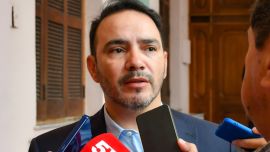President Javier Milei believes that Argentina will normalise in the future through the force of disruption. It is a risky bet, and one that has been tried before – with little success.
Argentina has much to offer the world, both now and in the coming decades. Its resources in food, energy, and mining arguably present the country with the best opportunity in its history to engage meaningfully in the global economy. But to seize this moment, Argentina must engage with the world.
President Milei’s first speech at the United Nations General Assembly this week was the latest example of the many fruitless symbolic battles that Argentina’s 21st-century Don Quixote chooses to fight to feed his foundational ego trip. Milei accused the organisation of promoting “a socialist agenda” and attempting “to impose a certain way of life on the citizens of the world.” He referred to the UN as “a multi-tentacled leviathan” implementing “a supranational governance model.”
It is unclear where exactly, other than in Milei’s mind, such a United Nations exists. If anything, the UN and its entire system have become mostly an empty shell over the past few decades, filled only with occasional goodwill speeches by powerless diplomats in suits. Its key institutions, like the Security Council, have not adapted to meet geopolitical changes, and economic entities that revolve around it, like the World Trade Organisation, are losing their influence to the forces of laissez-faire practices.
Contrary to Milei’s warnings, global governance is on a downward trajectory. The Covid-19 pandemic – which the President cited in his speech to slam the UN for lockdowns – was a clear sign of the diminishing influence of global institutions. Nonetheless, Milei is making Argentina act as if his assertions were accurate; for example, he has withdrawn the country from the Pact for the Future, a harmless declaration of principles with no tangible impact.
Argentina’s President does not need to burn bridges with the world to make his points, some of which might even be valid or worthy of discussion. For instance, just as UN Secretary-General António Guterres was stating at the opening of the General Assembly that “a future without fossil fuels is certain,” in Rio de Janeiro, the oil and gas industry was gathering for the biannual Rio Oil & Gas Conference to warn that hydrocarbons are nowhere near exiting the global energy matrix in the foreseeable future – quite the opposite. Climate change is at the heart of the “Pact of the Future” agenda.
The world has overestimated the “transition” aspect of the global energy challenge. Rio Oil & Gas was renamed ROG.E this year – a not-so-subtle attempt to mask the controversial hydrocarbons beneath a more palatable brand, accompanied by the tagline “Connecting energies.” However, during the event, when presenting its annual outlook for the energy market in Rio, OPEC (Organisation of the Petroleum Exporting Countries) boldly asserted that oil demand will grow rather than decrease. In fact, it urged the industry to push back against the narrative that energy companies must fully shift to renewables or face extinction.
“What the outlook underscores is that the fantasy of phasing out oil and gas bears no relation to fact,” OPEC Secretary-General Haitham Al Ghais stated during a presentation. “A realistic view of demand growth expectations necessitates adequate investments in oil and gas – today, tomorrow, and for many decades into the future.”
If this scenario materialises, it is good news for Argentina, as it would extend the window of opportunity for the country’s “traditional” energy resources to find a market. Rather than a transition – which implies moving from one stage to another – what the world is likely to witness in the coming decades is a rapid diversification of energy sources, with oil and gas continuing to play a dominant role, especially in countries without the financial means to invest in still-expensive and highly-subsidised renewable sources.
This future aligns well with Milei’s politically incorrect, anti-climate change stance. But instead of engaging in the conversation, the President prefers to lecture, often at a shouting volume. Investors not only want to know if, when, and how Milei and Economy Minister Luis Caputo will lift the ‘cepo’ currency controls but also whether the Milei experiment has a future.
Conversation, of course, also means listening to what others have to say. It shouldn’t be that difficult.




















Comments